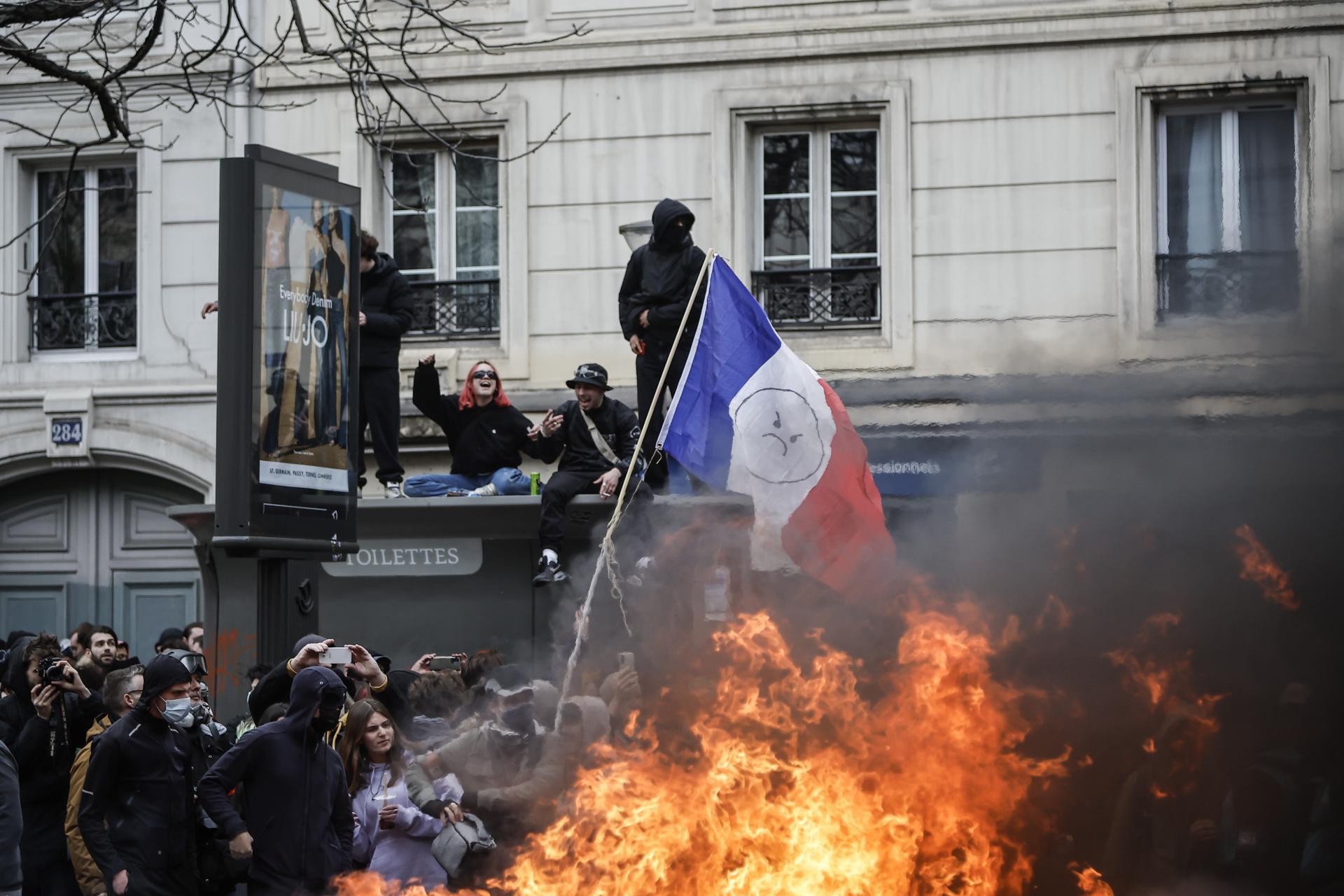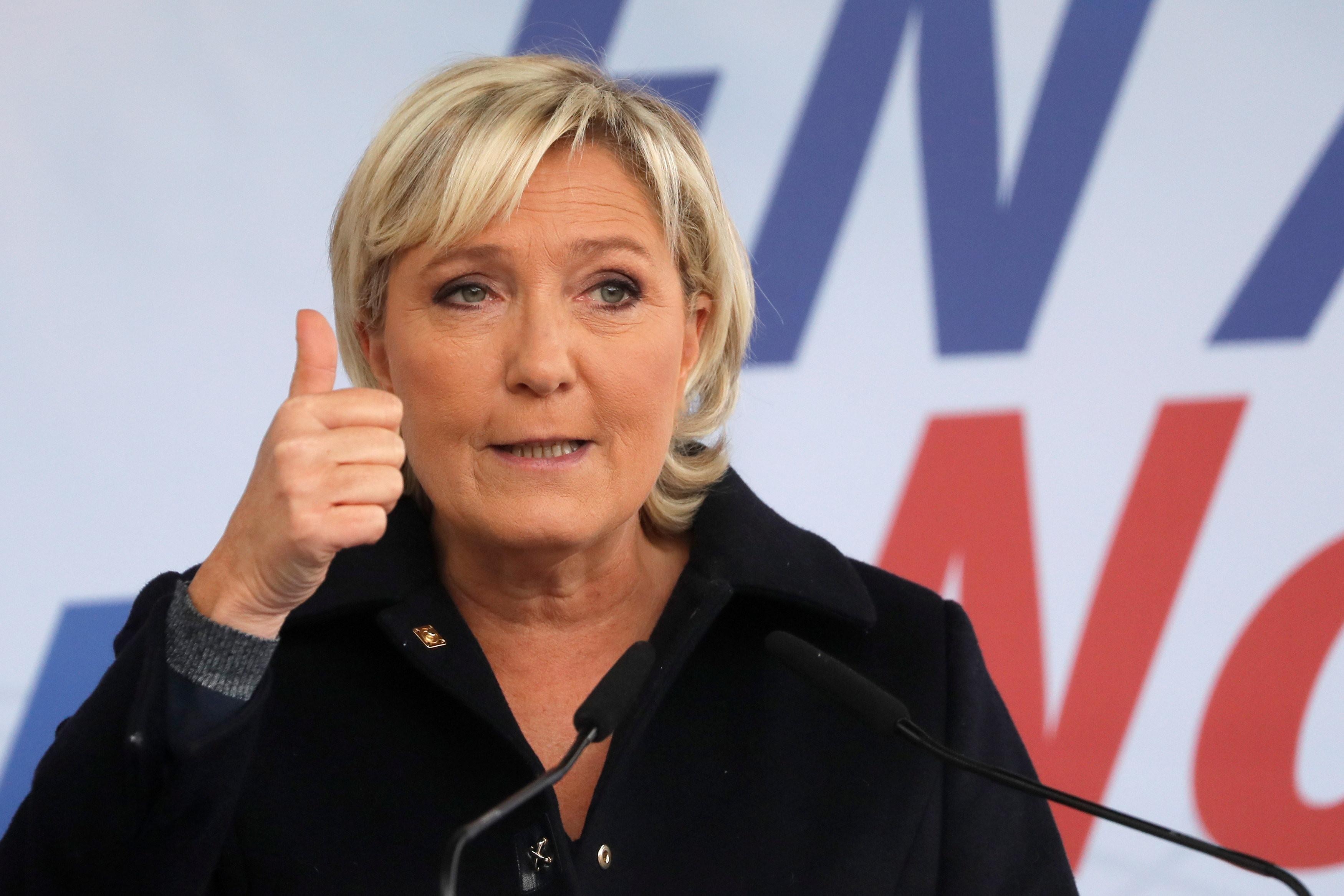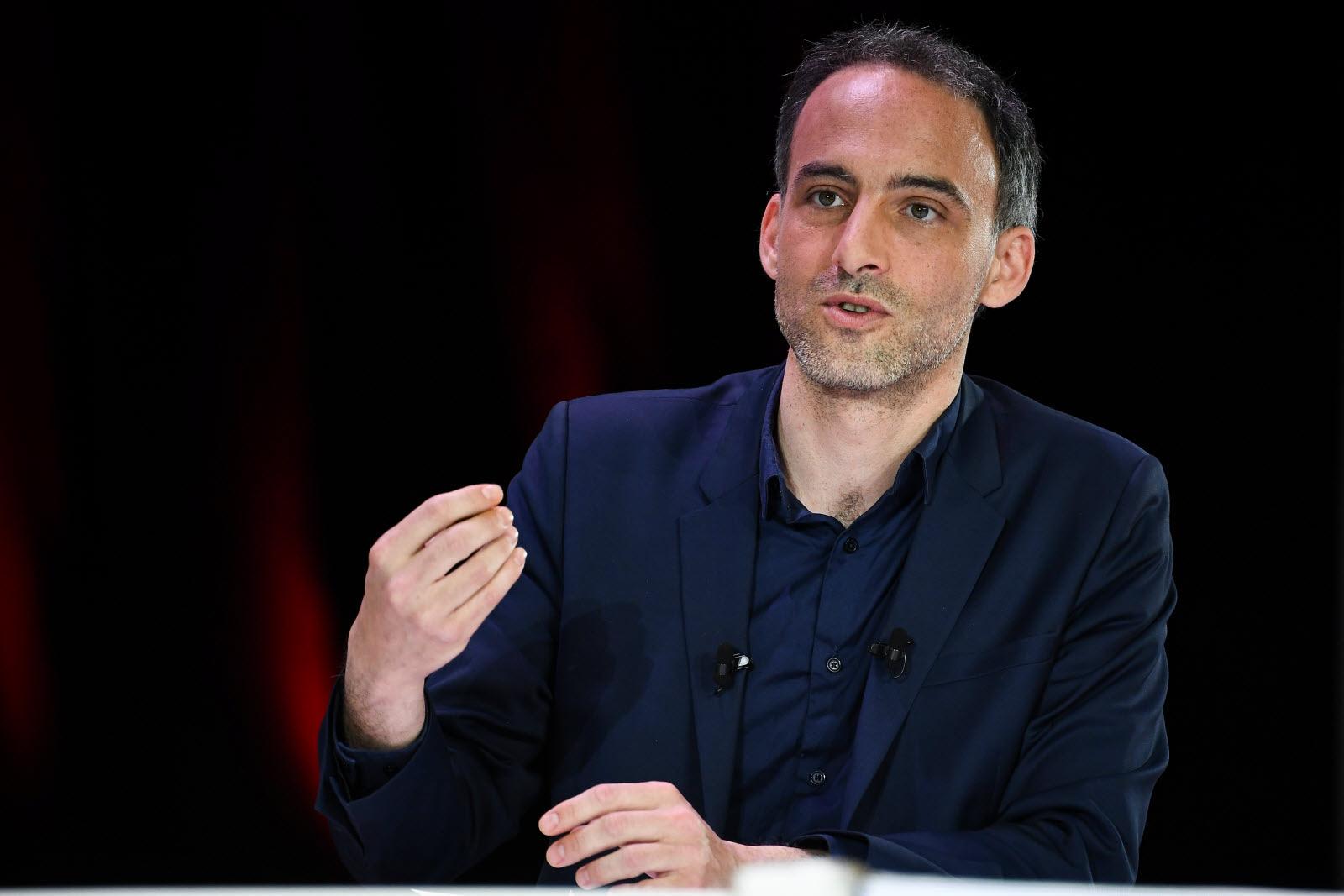European Parliament elections threaten Macron's dominance Political carnage
On June 9, parliamentary elections to the European Parliament will be held, the results of which may change the usual political landscape of Europe. In France, the extreme right-wing liberal forces supporting the current president may cause serious problems.
‘Political carnage’
Such harsh comparisons characterize the possible outcome of the European Parliament elections in the French media. Polls conducted in May give Macron's Renaissance party a very disappointing outlook. According to all the data, the far-right party of Marine Le Pen's Rassemblement Nationale (RN) is leading in the upcoming elections with 31% of the votes. At the same time, the French right-wingers are ahead of the Macronists with a gap of more than two times. Only 15% of French people are ready to vote for the pro-presidential party Renaissance.
But the real political ‘revival’ of the season was the unexpected return of the Socialists, who confidently took the 3rd place. For the list of the Socialist Party led by Raphael Glucksman (PS - Place Publique), previously almost completely written off, today are ready to give their votes already 14% of voters. Almost as many as for the party of the incumbent president. At the same time, experts note that support for the Macronist party may become even lower in the future. Only in April, according to one of the polls, the number of supporters of the presidential party decreased by 3.5 percent of the total voter list.
What's going on? Why does Macron's party have such a low rating while the government is trying to convince the French of its successes? After all, according to government figures, France seems to be economically ahead of Germany, Italy, and the UK. But the fact is that the average Frenchman does not care that his neighbors in the eurozone, which is in permanent crisis, are doing slightly worse than he is. More Macronists say that at the end of 2022, France's unemployment rate will hit a 40-year low of ‘only’ 7.1 percent. True, in 2023 it started to rise again. And today, 7.5 percent of France's able-bodied population is out of work.
At the same time, a significant number of French people perceive Macron as the ‘president of the rich’. And from the relative growth of profits of French corporations, the majority of ordinary French people do not care a bit. Especially against the background of the fact that Macron, his party, and his government have consistently pursued a policy of social cuts. The most typical example here is the pension reform, which raised the retirement age to 64. French trade unions responded to another neoliberal reform in 2023 with mass demonstrations and strikes, but Macron's government completely ignored the protests. The situation is similar for farmers, who this year rose against EU rules and the expansion of multinational corporations that are bankrupting their farms.

Macron and his cabinet's reforms have hurt both the unemployed and the less well-off. France's far-right has long been building its popularity, but it seems they have never seen such success. In the latest European Parliament elections in 2019, the gap between Macron and Le Pen was minimal. But this time, experts are prophesizing that the Rassemblement Nationale will be able to beat the Macronists by 10-13 points. Alarmed, President Macron is trying to take fire-fighting measures to salvage the situation. But he and his advisers have come up with nothing better than to partially copy the ideas and rhetoric of the far right. Critics argue that Macron's recent slogan ‘For France to remain France’ is a direct borrowing from right-wing populists.
The incumbent president has also shifted hard to the right in his attitude toward France's much-talked-about migration issue. But the attempt to win points on the field of his opponents from the nationalist camp has so far led to the opposite results. Thus, in December 2023, the presidential bill on immigration was passed only after the inclusion of clauses on tougher rules and with the support of the right-wing opposition. This allowed the Rassemblement Nationale to claim an ‘ideological victory’. But in Macron's coalition, it caused a crisis and the resignation of the health minister.
The president's promises to raise middle-class incomes are not helping the Renaissance Party much either. ‘Emmanuel, what about us?’ - tens of millions of ordinary workers, employees, and pensioners might reasonably ask him.
Emmanuel Macron is also trying to get even on the foreign policy platform, where he is spouting eccentric initiatives and statements. In particular, on 25 April he made a long speech at the Sorbonne, which lasted 1 hour and 45 minutes. In it, he spoke of the threats to Europe, which was allegedly ‘encircled’ by ‘great regional powers’. ‘Emancipated’, i. e. ‘regionalists’, such as Russia and Iran, that have gone out of the West's control, threaten European values.
And they must be countered with ‘European strategic defense autonomy’, a ‘European missile shield’, and so on. And Macron is also afraid of a Trump victory in America. But Macron's ‘Great Sorbonne Speech’ did not add positive dynamics to his party either. Because although he is trying to fit into De Gaulle's uniform and Konrad Adenauer's jacket at the same time, he does not shine with foreign policy successes. After all, it was under Macron that the Francafrique project with the withdrawal from ECOWAS of Mali, Niger, and Burkina Faso collapsed again. And then the other day there was the uprising of the Kanak people in the French colony of New Caledonia.
A threat from the right
And what is the secret of the growing popularity of the National Union? Some experts believe that the charismatic leader of this party's list, Jordão Bardella, plays a major role. He is 14-16 points ahead of Valerie Heyer, who heads the list of Macronists. So, Frenchmen and Frenchwomen bet on the young and therefore sympathize with the 28-year-old Bardella? Macron himself also seems to have embraced this logic. And not so long ago, he appointed 34-year-old Gabriel Attal as the new prime minister, who is supposedly better able to resist the onslaught of right-wing populists.
And it seems that the fashion for the young really works. According to the latest figures, Attal has seriously outpaced his patron Macron with 44 percent of voter support. For the incumbent president, who is no longer eligible to run, this is a shame, but not fatal. But the news that Bardella's personal rating has for the first time surpassed the popularity of the 55-year-old leader of the RN - Marine Le Pen, will not add to the good mood.

Still, the RN as a whole is increasing its rating not at all due to age preferences and not only due to the spread of xenophobic sentiments and the notorious migrant crisis. The far-right wants to limit uncontrolled migration through referendum measures. But in many ways, the National Union, which has abandoned right-wing extremist rhetoric, adds value by skillfully playing up the social agenda. And this allows right-wing populists to confidently capture a part of the traditional electorate of both leftists and liberals. For example, Marine Le Pen opposed the unpopular pension reform and supported the recent protests of French peasants. The leader of the National Union promises to lower the retirement age to 60, as well as to reduce VAT on essentials. It is no coincidence that Bardella already has the support of 53 percent of the workers surveyed, 41 percent of those French people who can barely make ends meet and 39 percent of those living in rural communes.
However, the socio-economic program of the extreme right is very vague and does not threaten the French establishment. Therefore, the Rassemblement Nationale can count on attracting the votes of a considerable part of the bourgeoisie and middle class, civil servants, and residents of big cities. As for the social promises to lower the retirement age and so on, you can always renege on them, can't you? For example, referring to the heavy inheritance left by the previous president and his cabinet. The Euroscepticism of the National Union also attracts a significant part of the voters, who are tired of the intrusive control of the bureaucracy from Brussels.
But here too, Marie Le Pen has moved away from her former radicalism and is not in favor of the ‘Francité’ or even of Paris' withdrawal from the eurozone. No, in the opinion of the current extreme right, the EU should simply grant a little more autonomy to its member states. And certainly, French nationalists do not question France's NATO membership either. Therefore, for Brussels and the global European elites, extreme right-wing parties are more of a safety valve. A kind of ‘emergency reset’ button for the EU in case of excessive social and national tensions within the union. Macron also accused Marine Le Pen of supporting Russia during the conflict in Ukraine. However, the extreme right has already voted in favor of resolutions condemning Russia. And Marine Le Pen herself is keen to show that she is a ‘dove of peace’.
In particular, the French nationalist leader criticized Macron for vague promises to send French troops to Ukraine. At the same time, she pointed out that France was in international isolation on this issue, not being supported either by the US or by the majority of European NATO allies. But Marine Le Pen is hardly a ‘peacemaker’. For example, like other leaders of the French extreme right, she has repeatedly called for supporting Armenia in its conflict with Azerbaijan. Marine Le Pen, in particular, stated: ‘The toughest firmness towards Baku and its protector Erdogan is the only way to interrupt this permanent threat hanging over Armenians.’
Under National Front founder Jean-Marie Le Pen, it was an openly anti-Semitic right-wing organization that denied the Holocaust and expressed sympathy for Nazi Germany. But in reversing the party's bad image, his daughter now claims solidarity with the State of Israel. Experts also say that Bardella's success was ensured by his active participation in social networks, where he was a leader compared to other politicians. But now both Valerie Heyer and the leader of the Socialist List, Raphael Glucksman, are almost equal to him in this area. It is also curious that the leader of the French ultra-nationalists, Jordaan Bardella, himself comes from a family of migrants. He is Algerian by father and Italian by mother. Bardella is a vivid representative of the modernized New Right, he is an opponent of same-sex marriage, but in the spirit of the times he is in favour of legalizing marijuana for ‘medicinal purposes’. The far-right has also taken a significant part of the electorate that previously supported the Gaullist Conservatives. But for most demoralized French voters, the ultra-nationalist vote is primarily a protest against Macron's discredited policies.
Moderate Left and even more to the left
While the electoral growth of the Rassemblement Nationale was predictable, the rise of the Socialist Party was a certain sensation. The Socialists were last in power between 2012 and 2017, but after that, having finally discredited themselves under Hollande by their apostasy from their principles, they lost ground. In the 2017 elections, the Socialist Party suffered a crushing defeat, winning only 30 seats instead of the previous 270. However, their perennial conservative opponents from the Gaullist party Union for a Popular Movement also weakened very badly. And the ‘social-liberal’- centrist Macron popped up in 2017 as a political surprise - just in the face of French disillusionment with traditional parties. For some time, the center-left president did manage to pick ‘electoral’ berries not only on the right but also partly on the political left.
But current Macron gives a strong bias to the right. Perhaps this right-wing power bias partly explains the new success of the Socialists. But in general, there are several serious reasons for this. First, the objective growth of contradictions and the aggravation of social injustice inside France. Also today, the domination of global corporations poses unpredictable threats to the entire world, where wars and conflicts are multiplying - from the Middle East to Ukraine. And it is the left-wing electorate that is usually most responsive to international agendas and military threats. In recent years the far right has indeed taken some of the workers' vote away from the left, which has largely abandoned its traditional values of social justice in favour of a politically correct agenda and minorities.

Today, the No. 1 man on the Socialists' list, Raphaël Glucksmann, is only 1-1.5 points behind the main Macronist Valerie Heyer. At the same time, his popularity is higher than that of the Renaissance list leader, also more French people have a good opinion of him. The top Socialist also receives the lowest percentage of voters' refusal to support him - 31 percent. Glucksmann is currently a member of the European Parliament, ranking 8th out of 24 in the French ‘favorite politicians’ ranking. Together with Bardella, Glucksmann, 44, appears to voters as ‘the most likable’ and ‘the most honest’.
But his electoral base is unstable - only 52 percent of supporters said they would probably vote for Glucksmann. The reason for this is probably that the moderate left has ceased to form a clear ideology and a corresponding electoral core, as was the case not only in the days of the legendary Jules Guede and Jean Jaurès but even François Mitterrand. It is also funny that the PS-Place Publique list is headed by a man who is not himself a member of the Socialist Party. Yes, yes, Raphael Glucksmann belongs to Place Publique (Town Square or Public Place), which is an independent social-democratic organization, just going to the European Parliament as a single list with the Socialists. Moreover, in French left-wing circles, there is an opinion about Public Place as an organization-oriented and dependent on the USA.
Glucksman himself once worked in Georgia as a counselor under Mikheil Saakashvili and is married to a Georgian, although he lives with a journalist of Lebanese-Armenian origin Lea Salameh. And for all Raphael Glucksmann's political charisma, it is above all the objectively worsened social realities under Macron that are driving the left forward. By comparison, in the 2019 European elections, the PS-Place Publique list led by the same Glucksmann received half as many votes, just 6.9 percent.
A serious rival to the Socialist Party is also the left-populist party La France Insoumise (La France Insoumise) of Jean-Luc Melanchon, which beat the Socialists in the 2022 elections to the National Assembly. And it looks like it is the list of Unconquered France led by Manon Aubry that could take the 4th place in the elections for the European Parliament. The current general crisis in the West is increasing the degree of sympathy for both the extreme right and the extreme left. Public polls show that the ‘unconquered’ get about 8 percent support.
But this is of course much less than the 19.5 percent and 4th place that Jean-Luc Mélenchon had in the 2017 presidential election. Critics in the leftist camp and trade unions explain the current results by explaining that, carried away by support for Palestine, Mélenchon and his party have paid less attention to the fall in living standards and real wages under Macron. Mélenchon himself has passionately opposed the war in Ukraine; MPs from Unconquered France, meanwhile, voted in the EU parliament in favor of arms supplies and increased military budgets. Also, candidates from the Ecologists (EELV) led by Marie Toussaint, the conservative Republicans (LR) of François-Xavier Bellamy, and another right-wing populist party Reconquest Marion Maréchal, the disgraced niece of Marine Le Pen, have a chance of breaking the 5 percent barrier.
The election champion is Monsieur `Nobody’
French voters have had a negative experience of elections due to what many believe is the Fifth Republic's Bonapartist constitution, where major powers are concentrated in the hands of the president. And if one is unlucky enough to have a president? Even less depends on the opinion of ordinary French citizens in the EU Parliament. Against the background of all this, the abstention rate in the current European Parliament elections threatens to be very high. French trade unions believe that there will be a particularly high number of abstentions among workers because the EU has long been ‘synonymous for them with privatization, job cuts, lower social spending, ‘free competition’... and war’.
According to trade unionists, the image of the EU as ‘the political wing of NATO’ has taken hold more than ever in recent years. Even worse is the reputation of President Macron and the political forces behind him, who are now trying in vain to compensate for their domestic and foreign policy failures by interfering in other people's affairs, including in the South Caucasus.
These elections to the European Parliament are also called a dress rehearsal for the future election of the president and deputies of the French National Assembly. But the national elections will take place only in 2027, and during this time very big changes may take place both in France and in the world. Only one thing is certain: ‘Macronism’ will remain in the history of the Fifth Republic as a symbol of a policy contrary to the interests of both the French people and the many independent states of the world. But already on the evening of 9 June, when the first results of the Euro elections will be known, an earthquake effect is expected in many political parties and institutions in France...








